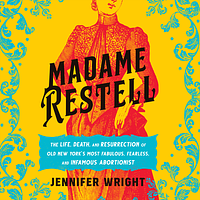You need to sign in or sign up before continuing.
Take a photo of a barcode or cover
4.5 stars. Highly recommend to anyone interested in a witty and engaging history about one of the women publicly centered in many of the abortion debates of the late 1800s. I learned so much from this book! Madame Restell is a CHARACTER and I literally had to stop and google to validate what I was reading because she was WILD. There were moments I had no trust in the author because there was no way Restell was just ping these things in 1840 and - yep, she WAS.
Great audiobook narrator. It’s been a long time since I’ve read a nonfiction book that is centers on female autonomy that takes an explicitly feminist POV on its subject matter, that still managing to make me laugh as I was learning. Great explicit connections to the mirrored events we have watched unfold over the last few years as the GOP has expanded their attacks on women’s rights. Also excellent use of shade, in academically researched and sourced material.
Because English immigrant Madame Restell is the individual woman and NYC the city in which the broader history is framed, there are some pretty blatant gaps in this book around safe abortion access disparities across race - the focus is instead on class and gaps between the elite and their servants. Wish there
a little more emphasis on the fallout of the emancipation proclamation and the civil war on the services Restell and others like her offered…
Nonetheless, fascinating take on how in just 50 years the political climate and culture wars were able to take what was relatively safe and affordable access to family planning away from women - particularly with the Comstock act in NYC. There are some hints on the evolution of the general medical school/training reckoning to come after the influenza pandemic of 1918… curious to see how male doctors really boxed out the midwives.
Anywho, you should read this book and learn about the roots of the body autonomy culture wars we still have to fight today.
Great audiobook narrator. It’s been a long time since I’ve read a nonfiction book that is centers on female autonomy that takes an explicitly feminist POV on its subject matter, that still managing to make me laugh as I was learning. Great explicit connections to the mirrored events we have watched unfold over the last few years as the GOP has expanded their attacks on women’s rights. Also excellent use of shade, in academically researched and sourced material.
Because English immigrant Madame Restell is the individual woman and NYC the city in which the broader history is framed, there are some pretty blatant gaps in this book around safe abortion access disparities across race - the focus is instead on class and gaps between the elite and their servants. Wish there
a little more emphasis on the fallout of the emancipation proclamation and the civil war on the services Restell and others like her offered…
Nonetheless, fascinating take on how in just 50 years the political climate and culture wars were able to take what was relatively safe and affordable access to family planning away from women - particularly with the Comstock act in NYC. There are some hints on the evolution of the general medical school/training reckoning to come after the influenza pandemic of 1918… curious to see how male doctors really boxed out the midwives.
Anywho, you should read this book and learn about the roots of the body autonomy culture wars we still have to fight today.
informative
medium-paced
informative
inspiring
reflective
sad
medium-paced
Jennifer Wright is my favorite historical non-fiction author. This book was such a well-written and necessary jaunt through history that serves as a microhistory of Madame Restell’s life and work, a broader discussion about women’s reproductive health in New York and the U.S. during the Gilded Age, and a powerful discussion about women’s reproductive health in modern-day America. Will definitely re-read this, and I highly recommend this book, as well as Wright’s other book: “Get Well Soon.”
Comes from a place of very strong research and strong point of view. Interesting and educational (if also depressing).
I had never heard about Madame Restell or even a lot about this historical period but was fascinated all the same. I always thought abortion was illegal and punished with the most strict sentences until Roe v. Wade, but knowing that it's changed makes me want to read more about this time period.
"And now here we are in the shadows again..."
Fantastic book- if you are passionate about women’s rights and reproductive justice, this is a must read. Jennifer does an amazing job weaving Madame Restell’s life with historical events and past and present political movements, all with humorous quips that had me laughing throughout the entire read. More importantly, Jennifer reminds us that people’s access to abortion and birth control in the US is a continuous battle that requires our strength, attention, and courage to fight for bodily autonomy.
dark
hopeful
informative
inspiring
medium-paced
It's a great story about a relatively unknown woman in history-- a fearless pioneer whose history is a mystery. At times the narrative seemed quite disjointed, but with actual gaps in Madame Restell's history, this is understandable and forgivable. Wright's powerhouse chapter is the final one in which she brings the historical issues home to the present and her own near-death birthing experience. Great one to discuss with lady friends.
This fiercely feminist biography shines the light on a notorious woman of history—Ann Trow, aka Madame Restell, the 5th Ave. abortionist and doctor. A self-made immigrant and millionaire who learned how to make abortive & birth control pills & perform surgical abortions, Restell lived a life of affluence & infamy in NYC in the mid-to-late 1800s. Unrepentant about her services & the rights of women to control their bodies, she toed the line between providing a service that many (women & men for their women) avowed her of & fighting against the people & organizations that tried to stop her. The most prominent was Anthony Comstock, an anti-vice activist, who turned his strict Christian beliefs into a lifelong crusade. Restell went to jail numerous times but it was Comstock's subterfuge that led her there for the final time. She ended up committing suicide...or did she? Yes, the rumor persists today that Restell faked her death.
This book is entertaining and enlightening—not just the info about Restell (who flaunted her fame & money), but also how similar the fight against abortion was then to now, particularly the misogyny that permeates the debate. The more things change, the more they stay the same. Or, as Wright puts it: "In America the pendulum is always swinging between enlightenment and puritanism, and never rests entirely to one side."
If you want to learn more about this fascinating woman and the history of abortion, absolutely read this book. Wright's style is bold and smart and shows her adept at writing "pop history."
This book is entertaining and enlightening—not just the info about Restell (who flaunted her fame & money), but also how similar the fight against abortion was then to now, particularly the misogyny that permeates the debate. The more things change, the more they stay the same. Or, as Wright puts it: "In America the pendulum is always swinging between enlightenment and puritanism, and never rests entirely to one side."
If you want to learn more about this fascinating woman and the history of abortion, absolutely read this book. Wright's style is bold and smart and shows her adept at writing "pop history."
Extremely well-researched and well-discussed. Madame Restell was, by all accounts, a complex woman and Jennifer Wright presents her in such a way that we get a full picture of her life—as neither devil nor saint—and the environment she lived within.
It was also so fascinating (and hugely important) to learn about the shifting views on reproductive rights in the United States over time and how contraceptive and abortive care was widely accepted in the early 1800s before undergoing a significant shift in the mid-1800s. A great book for anyone who loves biographies, anyone who wants to better understand American politics around reproductive rights, or really anyone at all.
It was also so fascinating (and hugely important) to learn about the shifting views on reproductive rights in the United States over time and how contraceptive and abortive care was widely accepted in the early 1800s before undergoing a significant shift in the mid-1800s. A great book for anyone who loves biographies, anyone who wants to better understand American politics around reproductive rights, or really anyone at all.





